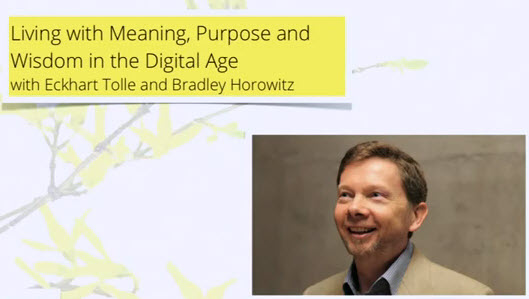Eckhart Tolle discusses the need to align your outer purpose (taking action in everyday life) with your inner purpose. He describes this ‘awakened doing’ as a means to transforming your life and work. The secret to achieving the alignment is consciousness – in this way your daily activity can be infused with your inner purpose.
Aligning your outer purpose with your inner purpose through consciousness
Whether you are a small business owner engaged in small business marketing or an Internet marketer, the same principles apply. There are some clear lessons for small business marketing in Eckhart Tolle’s work. He specifically talks about the limitations of your thoughts and emotions (the EGO) on your capacity to take right action in any circumstance. Eckhart Tolle argues that creativity is released through consciousness.
In a previous article, I identified ways to develop consciousness while using technology. This article drew on Eckhart Tolle’s discussion with Google staff about Technology and Consciousness and provided some concrete recommendations for tapping into the energy of the present moment.
I have taken these recommendations further in another article where I describe five ways to develop consciousness. I also illustrate the power of consciousness through an example.
You might ask, ‘Why develop consciousness?’ The answer lies in the improved quality of life that you will experience. Not only will you be able to access your creativity but also be able to enjoy peace, tranquillity, joy and happiness. When you bring your outer purpose (your daily actions) into alignment with your inner purpose, you will also experience a renewed enjoyment and enthusiasm for what you are doing.
Awakened doing – the three ways to gain alignment with your inner purpose
Eckhart Tolle describes these three ways as ‘the three modalities of awakened doing’. While they represent ways to achieve alignment between your outer and inner purpose, they also represent states of being – ways of being in the world. I will describe each of the three ‘modalities’ below:
1. Acceptance – at peace in an unwanted situation
You will often find yourself in a situation that you do not enjoy. It may be a testy customer, a computer breakdown, spilt soup over your work, lost papers or any other situation that tries your patience. You can rant and rave, blame others for the situation or become frustrated and unfocused…or you can surrender to the situation and accept it with calmness. This alternative is what Eckhart Tolle calls acceptance. He argues that acceptance brings peace which has its own vibrational energy. Through acceptance, you are attaining consciousness in the moment and taking responsibility for your own life and its quality. I have found that this simple state of acceptance has enabled me to be at peace when I would otherwise be in turmoil because of my thoughts and attendant emotions. An associated benefit is that because acceptance requires you to access your consciousness, you are open to creative ways to handle your undesirable situation.
2. Enjoyment – the joy of being conscious
There is so much that you do that you may find boring or tedious. It could be social bookmarking, travelling to your work, taking out the rubbish, clearing the dirty dishes or even writing. You could focus on how life will be different in an ideal future or regret how much better it was in the past – and exacerbate your unease. Alternatively, you could develop consciousness in the moment and enjoy being fully present to what you are doing. Consciousness gives you access to joy – the joy of being fully present. So it is not the action that brings enjoyment but accessing the power of consciousness and enabling it to pervade what you are doing.
3. Enthusiasm – energy through realisation of your outer purpose
Have you ever found yourself highly enthusiastic in undertaking some task or project? What was driving you to renewed levels of energy? Eckhart Tolle suggests that if you continue to pursue the awakening of consciousness (your inner purpose), you will eventually gain a realisation of your outer purpose – what you are meant to achieve ethrough your life and work. Your activity then becomes infused with more meaning and you exude enthusiasm and new found levels of energy. At this stage, you have achieved an alignment between your inner purpose and your outer purpose and the outcome is renewed enthusiasm for, and creative pursuit of, your vision.



